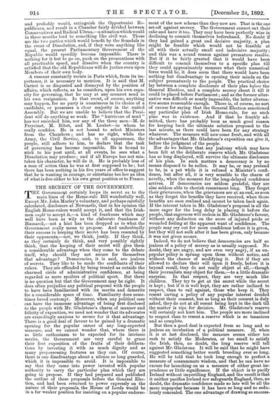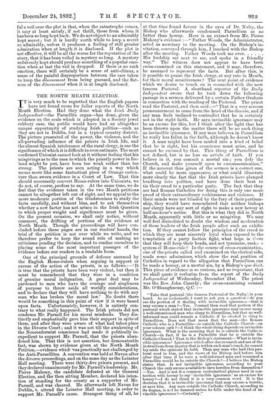THE SECRECY OF THE GOVERNMENT. T HE Government certainly keeps its
secret as to the main lines of the Home-rule Bill wonderfully well. Except Mr. John liorley's voluntary, and perhaps carefully calculated, disclosure at Newcastle, that in his opinion the English Home-rulers would accept it, and that the Irish- men ought to accept it,—a kind of frankness which may well have been as wily as the elaborate frankness of Bismarck,—not a hint has been dropped as to what the Government really mean to propose. And undoubtedly their success in keeping their secret has been resented by their opponents,—not, we think, justly. If they think, as they certainly do think, and very possibly rightly think, that the keeping of their secret will give them a considerable advantage when they come to the debate itself, why should they not secure for themselves that advantage ? Democracies, it is said, are jealous of secrets. They like to be made the confidants of their rulers. They are offended by being treated as outside the charmed circle of administrative confidence, at being regarded as mere spoilers of political sport. But there is no question but that the Government may be right. It does often prejudice any political proposal with the people to have been familiarised with its merits and demerits for a considerable space of time. Familiarity does some- times breed contempt. Moreover, when any political case can have the immense advantage of being first disclosed to the people with Mr. Gladstone's charm of manner and felicity of exposition, we need not wonder that its advocates are exceedingly anxious to secure for it that advantage. There is a good deal of favour to be gained by a dramatic opening for the popular career of any long-expected measure, and we cannot wonder that, where there is so little enthusiasm to be expected for its intrinsic merits, the Government are very careful to grace their first exposition of the fruits of their delibera- tions by investing it with as much dignity and as many prepossessing features as they can. Of course, there is one disadvantage about a silence so long guarded, which it is impossible to avoid. It is impossible to say that they came into power invested with popular authority to carry the particular plan which they are going to propose. If they had prepared and published the outline of these proposals before the General Elec- tion, and had been returned to power expressly on the nature of their proposals, the House of Lords would be in a far weaker position for insisting on a popular endorse- ment of the new scheme than they now are. That is the one set-off against secrecy. The Government cannot eat their cake and have it too. They may have been perfectly wise in declining to commit themselves beforehand. No doubt if they had gained a great and decisive majority, a plan might be feasible which would not be feasible at all with their actually small and indecisive majority ; and this was a sound reason against premature resolve. But if it be fairly granted. that it would have been difficult to commit themselves to a specific plan till they could approximately measure what their numerical force would be, it does seem that there would have been nothing but disadvantage in opening their minds on the subject prematurely to the people. The practical choice lay between a complete disclosure of their plan before the General Election, and a complete secrecy about it till it could be placed before Parliament ; and as the former alter- native was difficult or nearly impossible, the latter alterna- tive seems reasonable enough. There is, of course, no sort of excuse for saying that the General Election sanctioned any particular plan of Irish Home-rule, for no such plan was in existence. And if that be frankly ad- mitted, there has probably been as much good reason for keeping back the ultimate solution proposed to the last minute, as there could have been for any strategy whatever. The measure will now come fresh, and with all the advantages that Mr. Gladstone's exposition can give it, before the judgment of the people. Nor do we believe that any jealousy which may have been felt at the deliberate reserve which Mr. Gladstone has so long displayed, will survive the ultimate disclosure of his plan. In such matters a democracy is by no means disposed to be sullen. It may be, or may pretend to be, in a pet while it is refused a Minister's confi- dence, but after all, it is very sensible to the charm of novelty, when the moment for the long-delayed confidence arrives. If democracies are seldom grateful, they are also seldom able to cherish resentment long. They forget their grievances, when the grievances are at an end, as soon as they forget the benefits they have received, when those benefits are once realised and cannot be taken back again. If the interest taken in Mr. Gladstone's proposal is all the more eager for the long delay in placing it before the people, that eagerness will reckon in Mr. Gladstone's favour, without any deduction on the score of injured pride or wounded feeling at the apparent want of confidence. The people may cry out for more confidence before it is given, but they will not sulk after it has been given, only because it was not given sooner.
Indeed, we do not believe that democracies are half so jealous of a policy of secrecy as is usually supposed. No doubt, they are angry, and are even very angry, if an un- popular policy is sprung upon them without notice, and without the chance of modifying it. But if they are allowed to declare their will upon it freely, before it is beyond recall, they do not really object at all,—though their journalists may object for them,—to a little dramatic surprise. In that respect, they are very much like children. They try to get at the secret while the secret is kept ; but if it is well kept, they are rather inclined to respect, than to rail against, those who keep it. They resent having a policy of any popular interest decided without their consent, but so long as their consent is duly asked, they do not at all resent being kept in the dark till the matter is ripe for decision. Mr. Gladstone's reserve will certainly not hurt him. The people are more inclined to respect than to resent a reserve which is so tenacious and so complete.
But then a good deal is expected from so long and so jealous an incubation of a political measure. If, when it is at last disclosed, the measure seems either too rash to satisfy the Moderates, or too small to satisfy the Irish, then, no doubt, the long reserve will tell against Mr. Gladstone. It will be said that he might have suggested something better worth brooding over so long. He will be told that he took long enough to perfect a measure of consummate wisdom, and that he can have no excuse for launching on us a measure of either great im- prudence or little significance. If the object is to pacify Ireland without imperilling England, and the result is that it neither pacifies Ireland nor safeguards England, then, no doubt, the dramatic confidence made so late will be all the more unpopular because it has been so long and so sedu- lously concealed. The one advantage of drawing so success- ful a veil over the plot is that when the catastrophe comes, it may at least satisfy, if not thrill, those from whom it hasbeen so long kept back. We do not object to an admirably kept secret; but it is hardly worth while to keep a secret so admirably, unless it produces a feeling of still greater admiration when at length it is disclosed. If the plot is not effective, it will be all the worse for the reputation of the story, that it has been veiled in mystery so long. A mystery sedulously kept should produce something of a popular emo- tion when at last the veil is dropped. If there is no such emotion, there will certainly be a sense of anti-climax, a sense of the painful disproportion between the care taken to keep the c/64touement from being guessed, and the flat- ness of the denouement when it is at length disclosed.



































 Previous page
Previous page